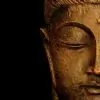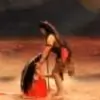This is what eminent mythologist dr Devdutt Pattnaik says in his books. As you can see, three of his book describe same event in three different way.Suffice to say Draupadi was dishonoured thoroughly. If not outright stripped of clothe, the dragging of her, itself should have had an effect on her clothings, she cannot arrive dressed immaculately, while being dragged on the sabha. That itself can be considered disrobing A person is nothing without their honour and shame. And the kauravas took that from draupadi.
++++++++++++++++++++++++++++++++++++++
Yudhishtira, the eldest of the five Pandava brothers, gambled away his kingdom, his brothers, himself, and finally their common wife, Draupadi, to their archenemies, the Kauravas. The Kauravas dragged Draupadi by the hair into the gambling hall and decided to humiliate the proud Pandava queen by disrobing her in public. This happened during Draupadi's menstrual period. Bound by the rules of the game and the laws of civilization, none of the kings, warriors, and noblemen assembled in the Kaurava court came to Draupadi's rescue. She stood there bleeding, naked, with hair unbound, seething with fury. Through tearful bloodshot eyes, she looked at her five husbands, who hung their heads in shame. The laws of dharma had failed in their promise to protect her. Man had abused her and would pay a terrible price. In her fury, Draupadi took an oath that she would not tie her hair until she had washed it with the blood of Kauravas. Mahabharata In the traditional retelling of the Mahabharata Draupadi is not disrobed. As the Kaurava Dushasana tugs on Draupadi's sari, he pulls out several hundred yards of cloth, and the sari is never undone. The miracle is attributed to Krishna, who is guardian of dharma and Vishnu incarnate. When Duryodhana orders Draupadi to sit on his left thigh"a place reserved for wives and concubines"the Pandava Bhima loses his temper and swears to break Duryodhana's thigh. All this does not stop Draupadi from taking her vow to wash her hair in blood. In one Tamil folk version of the Mahabharata, Draupadi's vow is more fierce, more dark. "I will wash my hair in Dushasana's blood. I will comb it with Duryodhana's hair. With Kaurava entrails will I tie it up, and with their hearts I will decorate it." As this vow is voiced, Draupadi with unbound hair appears less like the royal matriarch, queen of Indraprastha, wife of the five Pandavas, and mother of their five sons. She seems more a killer-goddess. The Kauravas transform into demons, the Pandavas into gods, with Krishna doing for them what Vishnu does for devas.
PATTANAIK, DEVDUTT (2000-09-01). The Goddess in India: The Five Faces of the Eternal Feminine (Kindle Locations 3496-3512). Inner Traditions Bear & Company. Kindle Edition.
++++++++++++++++++++++++++++++++++
The ever-obedient Dusshasana went into the women's quarters where Draupadi sat with hair unbound dressed in a single cloth stained with blood. Draupadi was startled by his audacity but before she could protest, Dusshasana grabbed her by her hair and dragged her through the palace corridors into the gambling hall. Draupadi kicked and tried to hold on to the pillars, but to no avail. She was no match for Dusshasana's brute force. She screamed but the women in the palace corridors withdrew into the shadows, too terrified to help.
...
The gambling hall saw what could not be imagined" Draupadi, barely covered, hair unbound, pushed to the floor at Duryodhana's feet. Not one of the assembled men came to Draupadi's rescue. The elders maintained a stony silence while the Pandavas hung their heads in shame. For shame, stop! I am the daughter of the king of Panchala, your sister-in-law, the king's daughter-in-law,' cried Draupadi. No one responded.
...
Turning to Draupadi, who had disqualified him from participating in her swayamvara, he said, Ancient law allows a woman to go to only four men with the permission of her husband. You have been with five husbands. That makes you a wh**e, public property, to be treated as your master's will.' Yes, we can do anything we want with you,' said Duryodhana arrogantly. I want my slaves, all six of them, to be stripped of their clothes.' The Pandavas lowered their heads and did as told, removing their upper and their lower garments. Draupadi wailed at their misfortune. Her too,' said Duryodhana pointing to Draupadi, Strip her naked, Dusshasana. Let the world see the legendary beauty of our new slave.' Everyone was shocked by Duryodhana's instructions, yet not one spoke up: the Pandavas because they were not in a position to do so and the elders because they felt Duryodhana was behaving within the confines of dharma. Yuyutsu, Dhritarashtra's son by a maid, tried to protest. But he was silenced and so lowered his eyes in shame. Dhritarashtra, the king, said nothing because he loved his sons too much and could never find fault with them. Bhishma and Drona and Kripa struggled with their own emotions; no law had been broken, so they found it difficult to even register a protest. Draupadi realized she was all alone and helpless. As Dusshasana grabbed her robe and started to yank it, she raised her arms towards the heavens and cried, Save me, God, there is none but you who I can turn to.' Her wail reached the heavens. The pillars of the gambling hall began to weep. The skies turned dark. The sun hid in shame. Then, something happened" something truly incredible! Every time Dusshasana pulled away Draupadi's sari, he found her covered with another sari. When he pulled that away, he found her still covered with yet another sari. He pulled several reams of fabric off Draupadi's body but she remained covered, her honour intact.
This was unbelievable. This was without doubt a miracle, an act of God defying the laws of logic, space and time. God was on the side of Draupadi and against the Kauravas. God had stood up when man had not.
Pattanaik, Devdutt (2010-08-16). Jaya: An Illustrated Retelling of the Mahabharata (pp. 146-147). Penguin Books Ltd. Kindle Edition.
++++++++++++++++++++++
Draupadi, gambled away by her five husbands, now a Kaurava slave, is dragged by her hair, brought to the gambling hall and disrobed in public. She demands justice, appeals to clemency, but no one comes to her rescue. Everyone hides behind the letter of the law. The spirit of dharma is totally forgotten as Draupadi screams in horror and raises her arms in utter helplessness.
This is when Krishna reveals his divinity. Miraculously, bending space and time, Krishna ensures that every cloth that is removed from Draupadi's body is replaced by another cloth. This is Vishnu acting as Govinda, the cowherd, protecting the earth-cow who is being abused by her so-called guardians, the kings. He promises to rid the earth of such unrighteous kings. He promises to wash her tears with their blood.
PATTANAIK, DEVDUTT (2012-05-22). Seven secrets of Vishnu (Kindle Locations 1258-1261). Westland Publishing. Kindle Edition.
PATTANAIK, DEVDUTT (2012-05-22). Seven secrets of Vishnu (Kindle Locations 1254-1257). Westland Publishing. Kindle Edition.
































